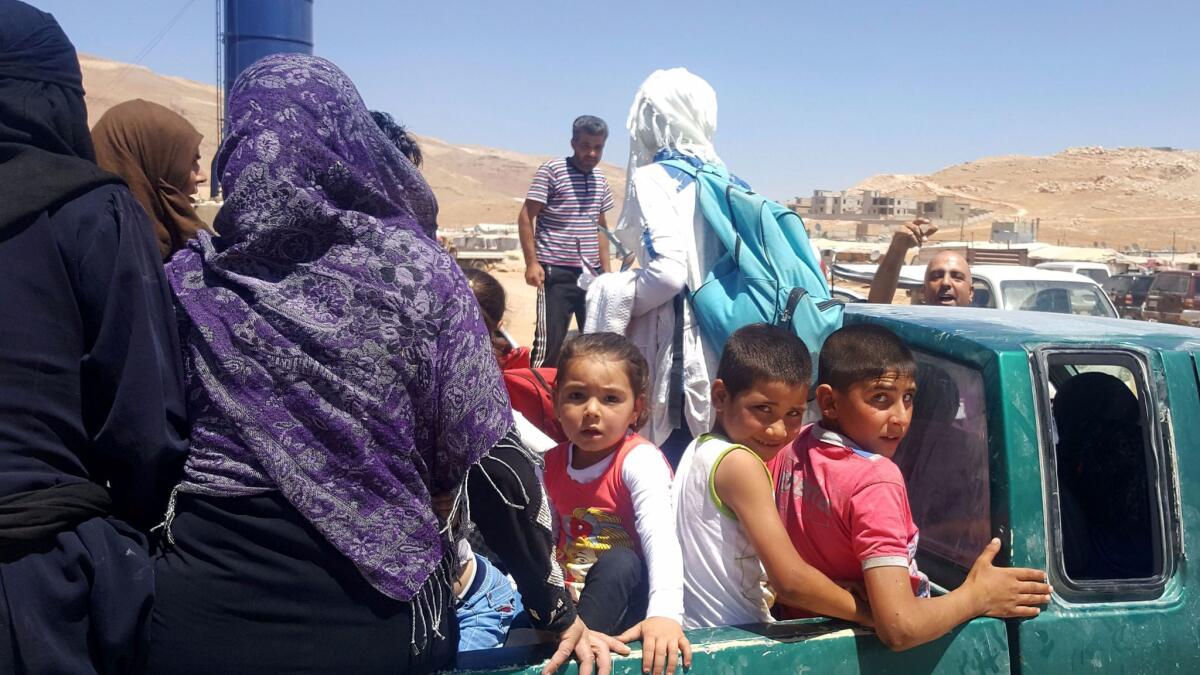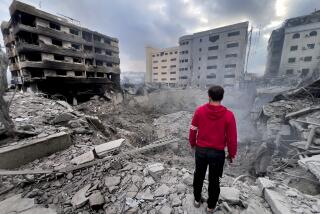Lebanese town looks for relief after three tough years tied to Syrian civil war

Reporting from Arsal, Lebanon — Ayman Hujairi’s stone quarry in the barren hills outside the town of Arsal on Lebanon’s northeast border closed its doors after fighting broke out between Syrian militant groups and the Lebanese army three years ago.
Then his stone-cutting factory, also shuttered, was looted of all its machines and equipment, down to the wiring.
For the record:
12:24 a.m. Aug. 24, 2019An earlier version of this article reported that there were 1 million Syrian refugees in Arsal, Lebanon. There are 1 million Syrian refugees in the entire country of Lebanon.
But last month the Islamist group formerly known as Al Nusra Front was routed from the outskirts of Arsal. Hujairi and other residents are hoping life will return to normal for a town that has become emblematic of the destabilizing effects of the Syrian civil war next door.
“All the people living inside Arsal are just waiting for the factories to go back to work,” Hujairi said Friday, sipping strong Arabic coffee on the veranda of his home — its walls constructed from the rose and brown-patterned stone he used to mine and cut, known in Arabic as “tiger’s skin.”
The Syrian civil war was evident in Arsal from its beginning in 2011, as refugees began streaming across the nearby border and turning empty lots into makeshift encampments. Today, refugees outnumber Lebanese residents 2 to 1, with an estimated 80,000 refugees to 40,000 Lebanese citizens, the town’s mayor said.
In 2014, after extremist groups Islamic State and Al Nusra Front launched attacks on the Lebanese Army in the area, Arsal became representative of fears that the bloodshed next door would spill into Lebanon — and the town became a de facto prison to both the refugees and Lebanese residents.
The Lebanese Army cordoned off Arsal, making travel to and from the town cumbersome at best and impossible at worst. Aid groups were largely unable to reach the refugee camps.
The quarries, stone factories and orchards that had driven Arsal’s economy largely shut their doors.
The town’s isolation even extended to daily communications — the Army cut off access to mobile data networks in the area, in a bid to keep militant groups from accessing the Internet.
Now the town has become evidence of turning political tides in Syria and in Lebanon. Last month, the Lebanese militia Hezbollah — an Iran-backed group that supports the Syrian government — launched a military offensive that routed Nusra from Arsal.
The Lebanese army has since launched an operation against pockets of Islamic State fighters nearby. As of Friday, the only evidence in Arsal of that battle was an occasional boom in the distance.
But there was a more obvious sign of the town’s changing fortune: For the first time in three years, 3G networks had been restored.
Arsal’s mayor, Basil Hujairi, said soon the factories and quarries will also be able to reopen.
The fate of the town’s refugees is still an open question. The recent Hezbollah offensive ended in an agreement between Hezbollah and the rebel coalition Hayat Tahrir Sham that sent as many as 9,000 Syrian militants and civilian refugees back to so-called “safe zones” in Syria, while several thousand more civilian refugees fled from the areas controlled by the militants into the town of Arsal.
Another 3,000 Syrian fighters and refugees left this month under a separate deal worked out between Hezbollah and the moderate rebel group Saraya Ahl Sham, which was also operating in the area, raising fears in some quarters that the deals could herald a forced return of refugees from Lebanon to Syria.
Hezbollah supports Syrian President Bashar Assad, while Saraya Ahl Sham wants him removed from power.
Mayor Hujairi said negotiations are underway for another deal that would return about 1,000 refugees living in and around Arsal to Syria. He said the system would be voluntary.
“The only thing the municipality of Arsal wants is for the fighters to go out from Arsal, but as for the refugees, the municipality welcomes them,” Hujairi said. “No one is forcing them to leave.”
Like the refugees coming from Syria, the Lebanese population of Arsal is primarily Sunni Muslim, and the town’s government supports Lebanese political factions that oppose the Syrian regime — as do most of the refugees. Because of that, there has been less tension in Arsal than in some other areas of Lebanon. The country hosts more than 1 million Syrian refugees, while its own population was about 4 million before the Syrian war.
The mayor and factory owner said there had been no major tensions between the Syrians and Lebanese in the town. Fears that Islamic State sleeper cells might emerge in Arsal have not materialized.
On Friday, many of the tents in the informal refugee encampments scattered throughout the town were flying the Lebanese flag as a signal that their loyalties lie with their host country, not with the militant Islamist groups.
At the same time, Lebanese have complained about the influx of Syrians taking away already scarce jobs and business opportunities. The mayor noted that Syrian-operated stores sell goods for cheaper and undercut the Lebanese.
The owner of one of those stores, who asked to be identified only as Abu Aadel because of concerns about his safety, said even with the business, he can barely make ends meet.
Although he and his brother run a women’s clothing store in the center of downtown Arsal, Abu Aadel still lives in a tent provided by the United Nations refugee agency, for which he pays about $50 a month in rent to the landowner. He said he can’t afford the $250 monthly rent for an apartment on top of the $200 a month he pays for the storefront.
Like many refugees in Arsal, Abu Aadel said he is not yet prepared to consider going back to his home town, Qusayr, which he fled in 2013.
“I will think about going back when the Syrian Army gets out of Qusayr,” he said.
The Lebanese residents also remain cautious in their hopes that better days are coming for Arsal.
“There is security now, but thing are not normal yet,” said the factory owner, Hujairi. “When I start work again, I will feel that the situation is normal.”
Sewell is a special correspondent.
More to Read
Sign up for Essential California
The most important California stories and recommendations in your inbox every morning.
You may occasionally receive promotional content from the Los Angeles Times.











